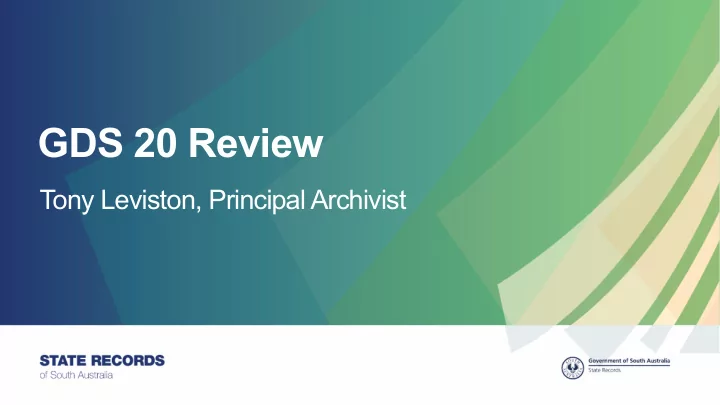

GDS 20 Review Tony Leviston, Principal Archivist
General Disposal Schedule 20 (GDS 20) Specifies how long all council information needs to be kept, whether digital or physical format Applies to records less than 50 years old Identifies minimum retention periods Identifies records of permanent value that are to be kept as part of the State archive Have had a local government disposal schedule since 1994 Fifth edition approved in June 2012, expires June 2019
Principles for revising GDS 20 1. reduce the complexity of the document, such as removing unnecessary duplication and reducing the number of separate disposal actions 2. clarify whether local councils, or State or Federal Government should retain the authoritative record where business processes cross jurisdictions 3. remove ambiguity in how records should be sentenced e.g. avoid using words like significant or major to distinguish permanent value records 4. ensure the disposal actions can be practically implemented (for digital and physical records) and do not require creation of records e.g. snapshots of rate assessments 5. ensure permanent value records meet State Records’ Appraisal of Official Records: Policy and Objectives .
GDS 20 Working Group (others welcome) • Rita Coombs, Alexandrina Council • Antonietta Spiniello, City of Norwood Payneham & St Peters • Denise McGarrigle, City of Playford • Di Colls and A Ristevski, City of West Torrens • Glen Heaysman, City of Charles Sturt • Jane Ratcliff, City of Adelaide • Zoey Squires, City of Prospect • Anna Rzad, City of Port Adelaide Enfield • Danna Slessor-Cobb, The Barossa Council • Julie Darling, Yorke Peninsula Council • Nathaniel Mason, City of Tea Tree Gully.
Project plan • (March 2016 – feedback on GDS 20 V5) • June 2018 – consultation on permanent value records against Appraisal of Official Records: Policy and Objectives (2003) to lgrm and lgit mailing lists • July to September 2018 – reviewing feedback received and format of document • October 2018 - new draft to go out for consultation • October 2018 to February 2019 - analyse recordkeeping requirements • February 2019 – finalise new draft for consultation • March to April 2018 – consultation with councils • May 2019 – submit revised draft to State Records Council
Proposed changes • Activity based – structured around business activities, to reduce duplication • Streamlined – rolled up disposal classes, to simplify the document • Retention – change language from Destroy to Retain, to emphasise minimum periods • Document recordkeeping requirements – clearer link to justifications for keeping records • Potentially less State archives – councils can maintain records as part of own historical archive (NOT external historical society) • Focus on council and executive meeting records – if paper on agenda, also need to retain records documenting background and context • Include legacy records no longer created, to reduce need for over 50 years schedule
Example
Implementation planning • Councils can still use existing business classification scheme (functions, activities) and map to the new schedule – will be a list of suggested functions • Disposal classes will be mapped between GDS 20 V5 and new version to assist with any re-sentencing required (likely to be permanent changing to temporary, and reduced periods for some temporary records) • Will develop csv version • Temporary freeze on transfers of permanent records, other than minute and rate books – contact us to discuss • Will be new numbering system
Contact • Tony.Leviston@sa.gov.au • 08 8343 6803 • staterecords@sa.gov.au • 08 8204 8791
Recommend
More recommend